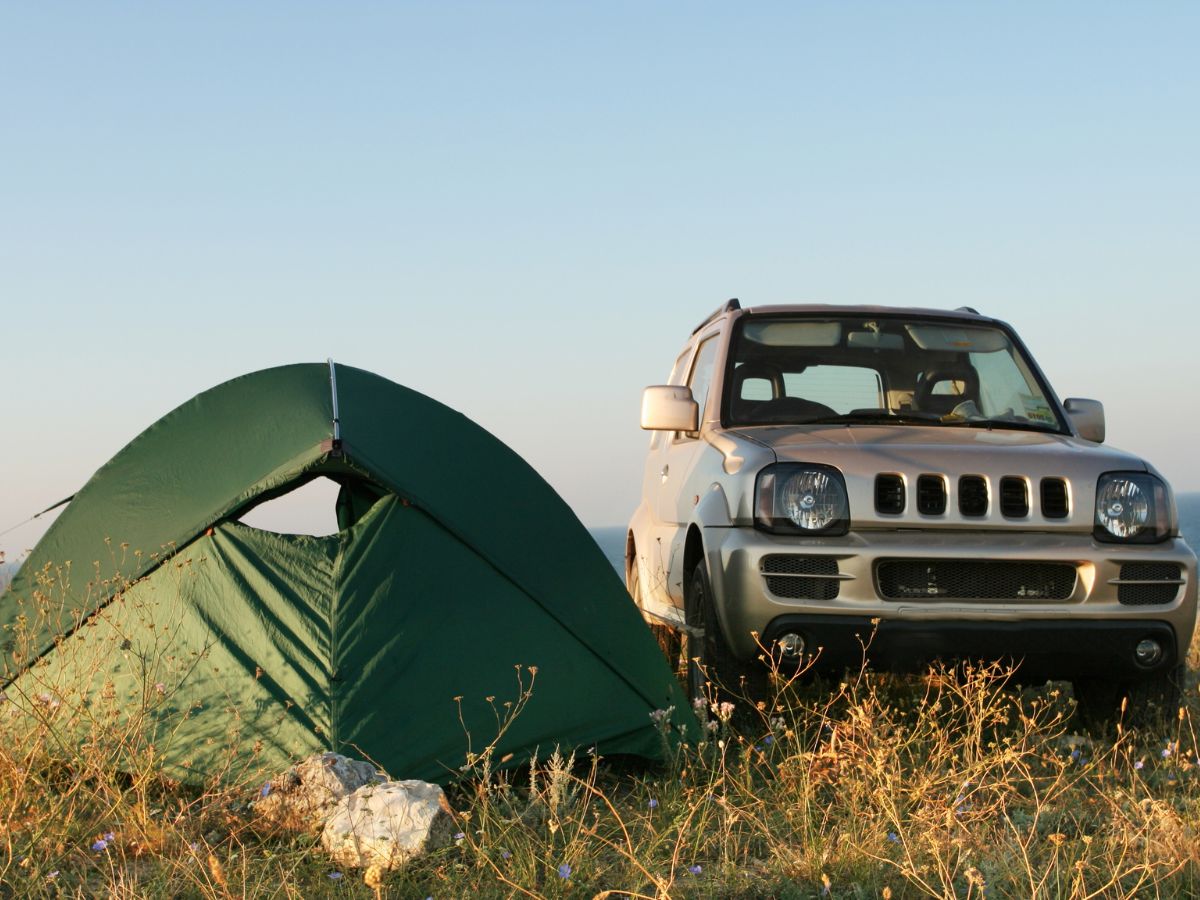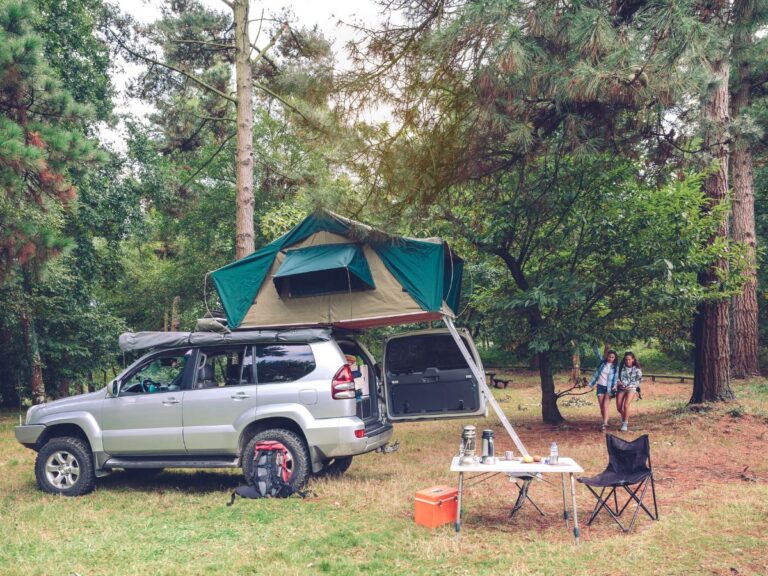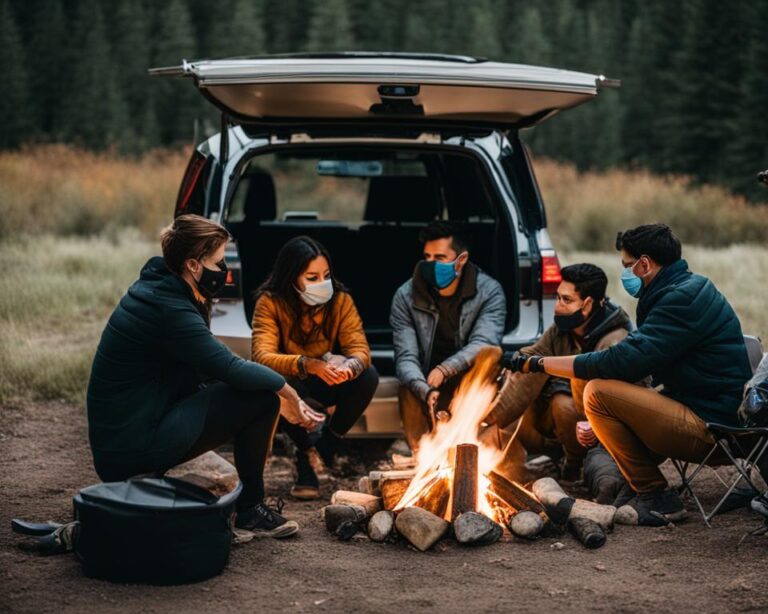Is Sleeping in a Car Safer Than a Tent?
Sleeping in a car can be safer than a tent for you. The car provides privacy, stability, and better temperature control, lessening encounters with wildlife. However, it may be cramped and less secure in remote areas. If you want to explore further advantages and disadvantages, weather protection tips, and security concerns between sleeping in a car versus a tent, you’ll find insightful details to help you make an informed decision.
Safety Considerations for Sleeping Outdoors
When considering safety for sleeping outdoors, it is important to assess potential risks and take necessary precautions. Emergency preparedness is key, so always have a first aid kit, emergency contacts, and knowledge of the area’s emergency services. Campsite selection is essential; choose a flat, elevated spot away from potential hazards like falling branches or flooding areas. Personal safety should be a top priority, so inform someone of your location and expected return time before heading out.
Gear storage is another critical aspect of outdoor sleeping safety. Keep all food securely stored to avoid attracting wildlife, and store any scented items away from your sleeping area. Make sure your tent (or car) is set up correctly, with secure stakes and guy lines if needed. Additionally, keep a flashlight or headlamp within reach for emergencies during the night. By being well-prepared and vigilant about safety measures, you can enjoy a safer outdoor sleeping experience.
Advantages of Sleeping in a Car
What practical benefits does sleeping in a car offer over traditional camping in a tent? When it comes to privacy benefits, sleeping in a car provides a significant advantage. The enclosed space of a car offers a level of privacy that is important to achieve in a tent, shielding you from external visibility. This can be vital for feeling secure and maintaining a sense of personal space while resting. Additionally, cars often come equipped with locking doors and windows, adding an extra layer of security compared to a tent.
In terms of comfort advantages, sleeping in a car can offer a more stable and insulated environment. You are protected from the elements and can regulate the temperature inside the vehicle more easily than in a tent. The cushioned seats or a flat surface with added blankets can provide a more comfortable sleeping arrangement compared to the ground in a tent. Being off the ground reduces the chances of encountering insects or small animals, enhancing your overall comfort and peace of mind while resting in your vehicle.
Disadvantages of Sleeping in a Car
Sleeping in a car may pose challenges due to insulation concerns, as vehicles are not typically designed for extended stays in extreme temperatures. Limited space within a car can also lead to discomfort and restricted movement while resting. Safety and security issues may arise when sleeping in a car, especially in unfamiliar or isolated locations.
Car Insulation Concerns
When evaluating the disadvantages of sleeping in a car, a critical aspect to take into account is the potential lack of insulation, which can lead to discomfort and compromised rest. Insulation in a car is mainly affected by the quality of window insulation and available heating options. Car window insulation, especially in older vehicles or those not specifically designed for sleeping, may not be sufficient to keep out cold drafts or maintain warmth effectively. This can result in a challenging sleep environment, especially in colder weather conditions. Additionally, if the car’s heating options are limited or non-existent, staying warm throughout the night can become a significant issue. Without proper insulation, you may find yourself struggling to get a good night’s sleep due to the discomfort caused by temperature fluctuations. To address these concerns, consider using additional insulating materials like thermal blankets or window covers, and make sure you have adequate heating solutions such as portable heaters or heated blankets to enhance your sleeping environment in the car.
Limited Space Challenges
Insulating a car for sleeping involves addressing limited space challenges, which can greatly impact your comfort and ability to rest effectively. When considering sleeping in a car over a tent, it’s important to recognize the following:
- Space Limitations: Cars have restricted space compared to tents, making it challenging to move around comfortably. This lack of space can lead to a cramped and claustrophobic sleeping environment, affecting your overall rest quality.
- Comfort Challenges: Sleeping in a car may mean contending with uncomfortable seating positions or uneven surfaces. These factors can cause body aches and disrupt your sleep, hindering your ability to fully recharge.
- Privacy Concerns and Hygiene Issues: Limited space in a car also raises concerns about privacy, especially in public areas. Additionally, maintaining hygiene can be difficult without access to proper facilities, impacting your comfort and well-being.
Addressing these space limitations, comfort challenges, privacy concerns, and hygiene issues is important when deciding between sleeping in a car versus a tent for a safe and restful experience.
Safety and Security
Limited space challenges in a car can also greatly impact your safety and security while sleeping, posing several disadvantages compared to camping in a tent. Privacy concerns are a significant issue when sleeping in a car, as the windows are transparent, leaving you exposed to anyone passing by. In a tent, you have more control over your privacy, being shielded from view by the fabric walls. Noise levels can also be a problem when sleeping in a car, especially if parked in a busy area or near a highway. The sounds of passing cars, people, or wildlife can disrupt your sleep and potentially pose safety risks if they startle you awake. Tents, on the other hand, provide a buffer from external noises, allowing for a quieter and more peaceful sleeping environment. When considering safety and security, the lack of privacy and potential noise disturbances make sleeping in a car less ideal compared to camping in a tent.
Advantages of Sleeping in a Tent
Sleeping in a tent offers a closer connection to nature, enhancing the overall outdoor experience by immersing you in the sights, sounds, and scents of the surrounding environment. When you choose to camp in a tent, you benefit from:
- Tent comfort, camping experience: Tents provide a cozy and comfortable shelter that shields you from the elements while still allowing you to feel the gentle breeze and hear the rustling leaves. The experience of falling asleep under the stars or waking up to the chirping of birds is unparalleled.
- Tent portability, outdoor adventures: Tents are lightweight and easy to carry, making them ideal for various outdoor adventures. Whether you’re backpacking through rugged terrain or exploring national parks, a tent can be your reliable companion, offering a convenient and portable sleeping option.
- Connection with nature: Unlike sleeping in a car, a tent allows you to fully immerse yourself in the natural surroundings. The sensation of being enveloped by the outdoors, with only a thin layer of fabric separating you from the wilderness, can be incredibly rewarding and rejuvenating.
Disadvantages of Sleeping in a Tent
When sleeping in a tent, you may find yourself vulnerable to the elements, such as rain, wind, and cold temperatures. Tents often lack proper insulation, leading to discomfort during colder nights or in extreme weather conditions. Additionally, the proximity to nature increases the likelihood of wildlife encounters, potentially disrupting your sleep and causing safety concerns.
Tent Vulnerability to Elements
Exposure to harsh weather conditions, such as heavy rain and strong winds, can greatly compromise the protection offered by a tent when sleeping outdoors. When considering the vulnerability of tents to the elements, it is essential to understand the following:
- Tent Durability: Tents are susceptible to wear and tear over time, especially when exposed to extreme weather conditions. Continuous exposure to rain, wind, and UV rays can weaken the tent fabric and seams, reducing its ability to keep you safe and dry.
- Waterproofing Techniques: While modern tents often come with waterproof coatings, these can wear off with extended use. In heavy rain, water may seep through the tent material, leading to a damp and uncomfortable sleeping environment.
- Wind Resistance: Tents, even when properly staked down, can struggle to withstand strong gusts of wind. This can result in collapsed tents, damaged poles, and ultimately leave you exposed to the elements.
Lack of Insulation
Considering the vulnerability of tents to the elements, one significant disadvantage of sleeping in a tent is the lack of insulation it provides, which can result in discomfort and exposure to temperature fluctuations during the night. Insulation is vital for temperature regulation, helping to keep warmth in during colder nights and heat out during warmer nights. Without proper insulation, tents are unable to adequately regulate internal temperatures, leading to potential discomfort for the occupants. This lack of insulation can cause sleep disturbances as individuals may feel too hot or too cold throughout the night, impacting their comfort levels and overall rest. Additionally, temperature fluctuations can also make it challenging to achieve a comfortable sleeping environment, affecting the quality of rest obtained. Hence, when choosing between sleeping in a car or a tent, it is important to consider the insulation capabilities of a tent to ensure efficient temperature regulation and comfort levels for a good night’s sleep.
Wildlife Encounters
Amidst the serenity of nature, the vulnerability of sleeping in a tent becomes apparent when it comes to potential wildlife encounters. When camping in a tent, you are more exposed to the elements of the wilderness, increasing the chances of unwanted interactions with wildlife. Here’s what you should consider:
- Noise Pollution: Tents provide minimal sound insulation, making it easier for wildlife noises to penetrate and disrupt your sleep. This can be unsettling, especially in the dead of night when every rustle and howl feels amplified.
- Light Pollution: The thin fabric of a tent offers little barrier against external light sources. If a passing flashlight or moonlight catches the attention of nocturnal animals, they may get curious and venture closer to investigate, potentially leading to a wildlife encounter.
- Lack of Physical Barrier: Unlike the solid structure of a car, a tent offers little protection against wildlife. In the event of an animal approaching, you are only separated by a thin layer of fabric, which may not be enough to deter curious or hungry creatures.
Weather Protection in a Car
When seeking weather protection in a car, ensuring proper insulation and ventilation is vital to maintaining comfort and safety. Car safety is paramount, and understanding how to optimize your vehicle for weather conditions is essential. Insulation materials like thermal blankets, foam pads, or reflective window covers can help regulate internal temperatures and protect against extreme heat or cold. Ventilation is equally important to prevent condensation build-up and ensure a fresh airflow within the car.
Tent durability is often a concern, but a well-prepared car can offer superior weather protection. Unlike tents that may tear or leak in heavy rain or strong winds, a car provides a solid structure that shields you from the elements. To enhance weather resistance, consider using weather stripping to seal gaps around doors and windows, and invest in window deflectors or rain guards to allow for ventilation during rain.
Weather Protection in a Tent
Proper weather protection in a tent requires selecting a durable and waterproof material to shield against rain and wind. When preparing for camping, ensuring your tent is weather-resistant is essential. Here are some key factors to keep in mind:
- Waterproofing Techniques: Look for tents with sealed seams and a waterproof rainfly to keep moisture out. Applying a seam sealer can further enhance water resistance.
- Sleeping Bag Options: Choose a sleeping bag rated for the expected temperature range to stay warm and comfortable throughout the night. Additionally, using a sleeping pad can provide insulation from the cold ground.
- Camping Gear for Temperature Regulation: Utilize ventilation options in your tent to prevent condensation buildup and maintain airflow. Dressing in layers can help regulate body temperature as the weather changes.
Security Concerns in a Car
Ensuring the security of your car while sleeping in it involves implementing strategic measures to minimize potential risks. When compared to tent security, a car provides a more robust physical barrier against external threats. One key aspect of car security is to lock all doors and windows securely before settling in for the night. Be sure to park in well-lit areas or designated camping spots to deter any unwanted attention. Additionally, consider investing in window shades or curtains to conceal your presence inside the vehicle. It is also advisable to keep valuable items out of sight to reduce the temptation for theft. While sleeping in a car offers more structural security than a tent, it is crucial to remain vigilant and aware of your surroundings. Regularly check on your surroundings and trust your instincts if something feels off. By prioritizing car security measures, you can enhance your safety and peace of mind while resting in your vehicle.
Security Concerns in a Tent
How can you enhance the security of your tent while camping to minimize potential risks? Ensuring your safety and peace of mind while sleeping in a tent involves addressing various security concerns. Here are three critical factors to explore:
- Noise disturbances: To mitigate noise disturbances that could potentially attract unwanted attention, choose a campsite away from high traffic areas or noisy neighbors. Consider using earplugs or a white noise machine to help drown out any disruptive sounds during the night.
- Privacy concerns: Maintain your privacy by setting up your tent in a secluded area within the campsite, away from paths or common areas. Use tent dividers or screens to create a barrier between your sleeping area and the outside world. Additionally, consider using a tent with opaque walls to prevent visibility from the outside.
- Security measures: Enhance security by locking your tent zippers together using a luggage lock when you are inside. Store valuables in a secure location within the tent, such as a lockable bag or hidden compartment. Familiarize yourself with the campsite’s security protocols and emergency procedures to stay prepared for any unforeseen circumstances. By addressing these security concerns, you can rest assured and enjoy a peaceful night’s sleep in your tent.
Choosing Between Sleeping in a Car or a Tent for Safety and Comfort
To sum up, the decision between sleeping in a car or a tent ultimately depends on various factors such as safety, comfort, and convenience. While sleeping in a car may offer more security and weather protection, it comes with limitations on space and ventilation. On the other hand, sleeping in a tent provides a more traditional outdoor experience but may be less secure and offer less protection from the elements. Consider your specific needs and preferences when choosing your sleeping arrangement.







